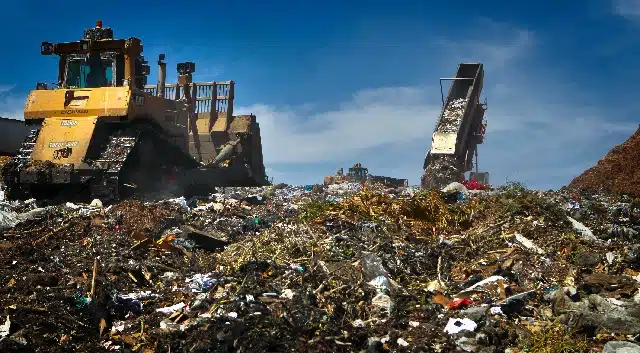Lowest fees in Las Vegas with no hidden costs.
Get a free consultation, call us now at: 702-710-9499.
Friendly waste management customer service staff.
Deliveries and pickups always on time.
We are a local family business in Las Vegas, NV.
Landfills are an important part of our modern waste management infrastructure, serving as the final resting place for all kinds of waste materials generated by human activity. In the state of Nevada, landfills play a critical role in managing the waste generated by the state’s growing population and economy. This essay will explore the history, regulations, and current state of landfills in Nevada, as well as their environmental and social impacts.

History of Landfills in Nevada
The history of landfills in Nevada dates back to the early days of settlement in the state. Prior to the establishment of formal waste management systems, people simply disposed of their waste in nearby fields or waterways. As the population grew and cities developed, waste disposal became a more pressing issue. In the early 20th century, many cities in Nevada established garbage dumps on the outskirts of town to manage their waste.
By the 1960s, concern about the environmental and health impacts of unregulated waste disposal led to the passage of the Solid Waste Disposal Act of 1965. This legislation established minimum standards for the management of solid waste, including the construction and operation of landfills. In Nevada, this law was implemented through the Nevada Division of Environmental Protection (NDEP), which oversees the permitting and operation of landfills in the state.
In the years since the passage of the Solid Waste Disposal Act, landfills in Nevada have become more sophisticated and regulated. The state has also experienced significant population growth and economic development, which have placed increasing pressure on the existing landfill capacity.
Regulations governing landfills in Nevada
The regulations governing landfills in Nevada are established by the NDEP, which enforces both state and federal standards. In order to operate a landfill in Nevada, an operator must obtain a permit from the NDEP, which includes a detailed plan for the construction, operation, and closure of the landfill.
The NDEP has established regulations for the location, design, and operation of landfills in order to protect public health and the environment. For example, landfills must be located away from sources of groundwater and surface water, and they must be designed to prevent the release of waste and leachate into the surrounding environment. They must also be lined with impermeable barriers to prevent contamination of the soil and groundwater. In addition, landfills must be monitored and maintained to ensure that they continue to meet regulatory standards.
In recent years, the NDEP has also established regulations aimed at reducing the amount of waste that is sent to landfills in Nevada. For example, the state has established a goal of recycling 25% of its waste by 2025. In addition, the state has implemented a ban on certain types of waste, such as electronic waste, from being disposed of in landfills.
The current state of landfills in Nevada
As of 2021, there will be approximately 30 active landfills in Nevada, according to the NDEP. These landfills vary in size and capacity, with the largest landfills located in the Las Vegas and Reno areas. The state also has a number of transfer stations, which serve as intermediate points for the collection and transfer of waste from smaller communities to larger landfills.
Despite the regulations governing the operation of landfills in Nevada, there are still concerns about their environmental and social impacts. One of the main concerns is the potential for groundwater contamination from leachate, which is the liquid that is generated when rainwater and other liquids come into contact with the waste in the landfill. This leachate can contain a variety of contaminants, including heavy metals and organic chemicals, which can potentially contaminate groundwater and surface water.
In addition to environmental concerns, there are also social concerns associated with landfills in Nevada. Landfills are often located in low-income communities or communities of color, which can lead to an unequal distribution of environmental burdens. Finally, landfills can also generate odors and noise, which can negatively impact the quality of life of nearby residents.
Landfills are an important part of our modern waste management infrastructure, and they play a critical role in managing the waste generated by the state of Nevada. Landfills in Nevada are subject to a variety of regulations established by the NDEP in order to protect public health and the environment. However, there are still concerns about their environmental and social impacts, and it is important to continue to monitor and regulate landfills in order to minimize these impacts.
NV Landfills play a crucial role in managing waste in the Las Vegas area, and the services offered by Las Vegas Dumpster Rentals Whiz are indispensable in ensuring responsible disposal practices.
Lowest fees in Las Vegas with no hidden costs.
Get a free consultation, call us now at: 702-710-9499.
Friendly waste management customer service staff.
Deliveries and pickups always on time.
We are a local family business in Las Vegas, NV.